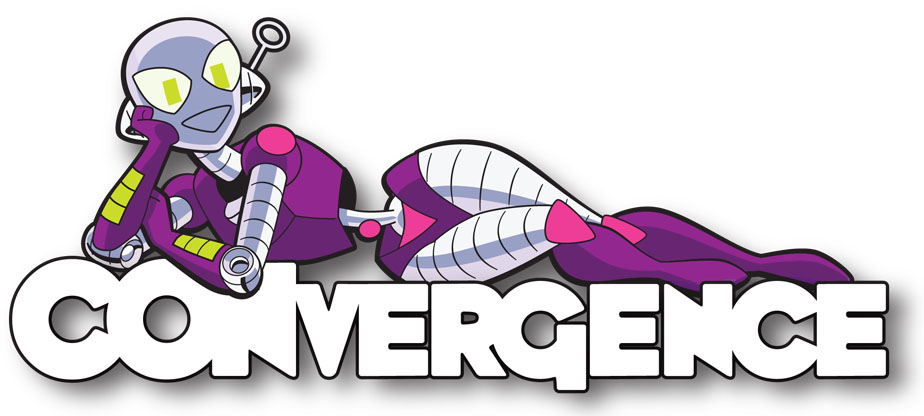CONvergence: Improving Diversity and Creating Safe Spaces for Geeks

Connie Mark 2, CONvergence’s supreme overlord. Did I say overlord? I meant mascot.
Despite the familiar smell of spray glue for costume armor, the familiar sight of glitter everywhere and the familiar feel of getting blindsided by some would-be dragon’s wings, CONvergence—the sci-fi and fantasy convention—feels less like a sci-fi convention and more like a geeky, 7000-person family reunion.
“For me, this is a community, even if we’re only together for four days a year,” said Jen Manna, a CONvergence operations sub-head and part of the small army of volunteers who run the Minneapolis convention.
It’s also a study in contrasts, like the one between the this year’s dystopian theme, “Double Plus Good,” and the many panels on social justice, like “Genre Feminism” and “That Elf Seems Awfully Queer to Me.” Even the requisite how-to-date-at-a-con panel — CONvergence is known as a party convention — was called “Enthusiastic Consent!”
Manna moderated a panel called “Beyond the Code of Conduct” dealing with making convention culture more accessible to all audiences. One topic was the evolution of harassment policies.
“The culture has changed, and that’s awesome, and it’s gotten really comfortable for me personally as someone who has been harassed a lot at conventions,” said Jackie Moore, a six-year CONvergence veteran. “It’s definitely worth it to make sure that an anti-harassment policy is all-encompassing and a little more detailed.”
Manna said it’s something the organizers are working on. It’s not the first time: According to Manna, CONvergence was the first convention to start a “Costumes Are Not Consent” campaign. “We wanted something that was an easy and nonthreatening way of saying ‘Hey! Think before you act!’” Manna said. “So we put up these posters.” From there, she said, it spread to other conventions, particularly with help from the Skepchicks, who frequent CONvergence. Now it’s global.
“Someone posted a picture of a ‘Costumes Are Not Consent’ poster in an Australian convention in Sydney,” Manna said.
“Costumes Are Not Consent” poster at CONvergence, along with the equally-ubiquitous Safe Space poster.
Still, there are areas where CONvergence still has a long way to go. Anthony Padilla, a 3-year con veteran, said race was one of them.
“I have to admit to some frustration,” Padilla said. “CONvergence is very open as far as sexuality, but it seems like that’s the only kind of diversity that’s acknowledged.” He recalled attending in years past, where he noticed “the only people I was seeing of ethnic diversity were the non-English-speaking cleaning crews. Basically I just saw white folk.”
However, Padilla said that has begun to improve this year. “I’ll say this, there’s actually a lot more diverse people,” he said. “There’s diverse people on the panels.”
Lee Blauersouth, who has attended every CONvergence except the first, agreed. “I almost didn’t go the Agent Carter panel yesterday,” Blauersouth said. “Because I love that show, but it was a race fail. I was afraid I was going to go down there, and someone was going to point that out, and a bunch of white people were going to go “black people didn’t exist in the ‘40s!” I was pleasantly surprised, because that did happen, and (the guy) got shut down immediately.”
Kris George, who said she’s been at CONvergence since it began, said the positive changes in racial and ethnic diversity have only happened recently. She credits rising inclusivity in geek media for making the culture more accessible, which, in turn, raises diversity at the convention.
“There’s actually a lot more cultural diversity than there used to be,” George said. “Some black attendees are bringing their friends, and they’re like, ‘There’s black superheroes! And there’s costumes and characters!”
Still, all on the panel said the con — and geek culture — has a ways to go, and it’s a frontier they’re still reaching for. “I think a lot of changes that need to happen in terms of being more inclusive and more accessible need to happen at the structural level,” Moore said. “We need to move beyond panels.”
Left to Right: Lee Blauersouth, Kris George, Anthony Padilla and Jen Manna make up three-fourths of the “Beyond the Code of Conduct” panel on inclusivity at CONvergence 2015 in Minneapolis. Not pictured: Jackie Moore.
This is not to say that social justice was the only topic of discussion at CONvergence. Panels like “How I Would Destroy The World With Science” outnumbered the social justice panels by about five to one, and that doesn’t take into account the movie rooms, crafts, art show, gaming, vendors and everything else one expects out of a con.
But that’s the rub: When a con has so many activities, there’s bound to be something for everyone — and if there isn’t, the volunteers are working to fix that.
Steve Musal is a journalist, a feminist, and a life-long geek and manages to balance those things just fine, thanks. Follow him on Twitter at @stevemusal.
(featured image via CONvergence)
—Please make note of The Mary Sue’s general comment policy.—
Do you follow The Mary Sue on Twitter, Facebook, Tumblr, Pinterest, & Google +?
Have a tip we should know? tips@themarysue.com